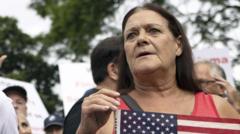The arrival of 49 white South African refugees in Washington DC highlights the ongoing tensions between South Africa and the Trump administration over land disputes and racial dynamics.
First Group of White South African Refugees Arrive in the US Amid Controversy

First Group of White South African Refugees Arrive in the US Amid Controversy
Controversial resettlement of Afrikaners sparks debate between South Africa and the US.
Forty-nine white South African farmers have begun their journey as the first to resettle in the United States under a plan initiated by President Donald Trump. They boarded a flight from Johannesburg on Sunday, landing in Washington DC later today. This move has stirred considerable debate, especially after South Africa's government denounced the American resettlement scheme as a "politically motivated" action amidst rising tensions between the two nations.
The US has been critical of South Africa’s domestic policies, particularly the government's approach to land redistribution, which it claims is discriminatory against white farmers. South African officials have contested this narrative, asserting that claims of land seizure without compensation lack basis. The diplomatic friction escalated following an executive order from President Trump, declaring that Afrikaners in South Africa face "racial discrimination."
In a response to Trump's stance, South Africa's ambassador to the US, Ebrahim Rasool, was expelled from his post after accusing Trump of manipulating the issue of racial dynamics to resonate with certain voter bases. The ongoing discourse raises critical questions about refugee policies and the implications of racial identity in international migration scenarios.
As the first group of these refugees arrives, their next stop is Texas, positioning them within a broader context of US immigration policy, which has seen significant restrictions on migrants and asylum seekers from other regions. The ongoing dialogue surrounding this resettlement reflects deeper issues of race, politics, and policy both in South Africa and the United States.





















